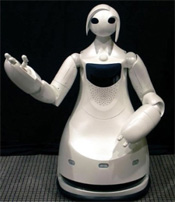
 On the first day of my very first job out of college, my new boss offered a piece of advice: “Be careful of making any personal relationships with your co-workers.” She was telling me this for good reason; the program I had joined was a fast-track to management, and she didn’t want me to have to manage my friends once the program had finished. However, the finality of her words stuck through me for that first year at the job, and I slowly evolved into a robot at work. I was functioning at maximum speed, obliging the polite “hellos” and “how was your weekend,” but always keeping my colleagues at arm’s length.
On the first day of my very first job out of college, my new boss offered a piece of advice: “Be careful of making any personal relationships with your co-workers.” She was telling me this for good reason; the program I had joined was a fast-track to management, and she didn’t want me to have to manage my friends once the program had finished. However, the finality of her words stuck through me for that first year at the job, and I slowly evolved into a robot at work. I was functioning at maximum speed, obliging the polite “hellos” and “how was your weekend,” but always keeping my colleagues at arm’s length.
When promotion time rolled around and I moved up to supervisor, I immediately relaxed. It became easier to befriend some of my fellow supervisors, and I quickly learned the line between boss and friend with my employees. To my surprise, the more engaged and involved I became with my co-workers, the quicker my career accelerated. Within a year of becoming supervisor, I had the #1 rated team in the department. I don’t want to give the wrong impression; I’m not attributing my success to having friends in high places, or being friends with my employees. What I am talking about here is something referred to as emotional intelligence (a term often times overused in the working world). I chose my friends carefully, confided in only a handful, and still then didn’t bring all my real world drama to the workplace. But by having a support system at work, I didn’t dread going in as much, and at times, I daresay, enjoyed being at work because of these people.
In terms of my employees, I think that I was able to motivate them in part by showing my human side. Often times, as we have experienced with our own managers, a new boss thinks that by showing his/her authority (i.e. bossing around, not listening to employee input, etc), this will establish the best environment. By listening to my employees input, doing something with their suggestions, rewarding them for their good performance, and showing them I cared, I was able to win the battle.
In my opinion, employees able to show their human side will always triumph over the robotic employees.
Now it’s your turn to weigh in: What work strategy do you think works better, and more importantly, which do you operate by?
This is a guest post by Lauren Kleinman.
Leave a Reply